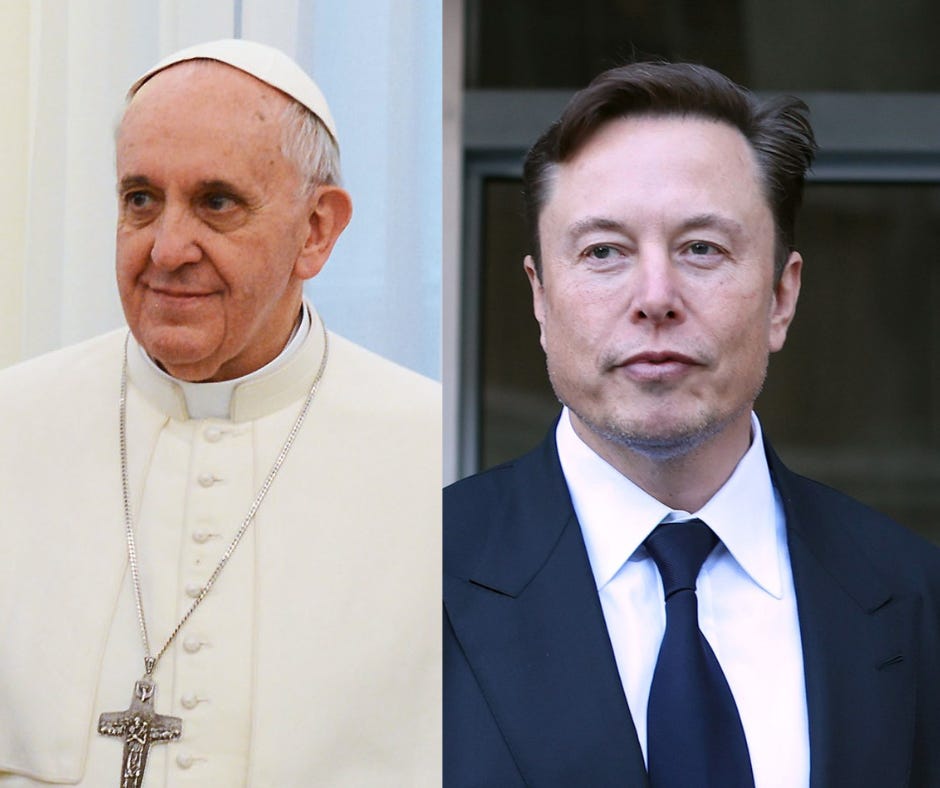Elon Musk vs Pope Francis on Mercy
Is mercy a key Christian virtue or is it one of the main causes of societal decline?
There has recently been some public discussion of the concept of self-destructive empathy and its unfortunate effects particularly in the political arena, prompted in part by Elon Musk’s deriding of ‘suicidal empathy’ and his claim that, ‘The fundamental weakness of Western civilization is empathy’. In essence, the claim is that understanding and sympathising with another person's suffering reduces the capacity to take necessary action, due to an overemphasis on that action’s harmful effects. Behind this criticism is a simple observation: any institutional decision will often cause some discomfort to some people. If this discomfort is given undue weight, then just and wise decisions may be prevented by an ill-judged sensitivity. If anything like such a criticism is correct, then an emphasis on empathy and related qualities such as mercy, sympathy and caring would be less of a resistance to the cruelty of modernity but rather a further expression of modernity and its vices. So, which is correct: is empathy a virtue lacking and needed in the modern world or in a distorted form is it part of the modern world’s failings?
Although there is undoubtedly some useful philosophical work to be done in carefully analysing and distinguishing between the related concepts involved here, I’m going to ignore all that and concentrate broadly on the concept of mercy. (Again, there is probably some useful work to be done in exploring the differences between the Latin ‘misericordia’ and ‘misereri’ and the English ‘mercy’, but that’s not something I’m going to attempt here.) One important reason for this is that such an emphasis on mercy was characteristic of Pope Francis’s pontificate, and now that some of the distracting noise surrounding his teaching has died down, it would seem opportune to re-assess some of its main principles.
Aquinas talks about mercy thus: ‘mercy is heartfelt sympathy for another's distress, impelling us to succour him if we can’ (S.Th. IIa IIae, q.30 a.1 resp.). A virtue in general in Thomist and Aristotelian philosophy is roughly the mean between two extremes: the extreme of too much (which is presumably where self-destructive empathy lies) and too little (which is where the vice of callousness will be found). Therefore, if Pope Francis is correct, the modern world is likely to be dominated by the vice of callousness and insensitivity while, if the proponents of an attack on self-destructive empathy are correct, the main modern vice will be that of too much sensitivity and mercy. (It is of course entirely possible that, in different circumstances, we lurch from too much to too little mercy.)
It is tempting to regard the case for the dangers of self-destructive empathy as being more prominent in our current situation due to an obvious emphasis on oppression and minority rights and, more generally, on feelings in many western institutions and cultures. Certainly, the language of oppression and of paying attention to feelings is a common currency in much public discourse in the West in a way that it was not for previous generations. That said, there are strong reasons to believe that mercy as in Pope Francis’s approach should indeed be more of a presence in modern western society. In essence, mercy is an acknowledgement of the humanity of those around us. Suffering in its many forms is one of the deepest aspects of our lives and, to the extent that we ignore that most human aspect of life in other people, we fail to treat them as fully human. A modern society which emphasises competition, economic success and iron self-discipline in the achievement of goals is likely be one which underestimates the importance of mercy towards failure in these areas.
It's beyond the scope of this essay to decide finally whether Pope Francis’ emphasis on mercy and sometimes explicit condemnation of the rigidity of institutions or personalities is at least a very important criticism of modernity and perhaps even the most important. However to the extent that modern western society holds a view of life in which human beings are assessed only by their effectiveness as means to a material end, or one where our society is dominated by the Great Men and Women who are achievers and doers while the rest of us flounder around in a sea of uselessness, the benefits of an increased emphasis on mercy at least look plausible. It would be a pity, now that Pope Francis has died and the attention of both Catholics and the rest of the world moves on to other things, if his characteristic call for greater mercy in modernity is overlooked, even if its precise implementation remains, as with all the virtues, a difficult matter requiring both God's grace and the virtue of practical wisdom.
By Stephen Watt

